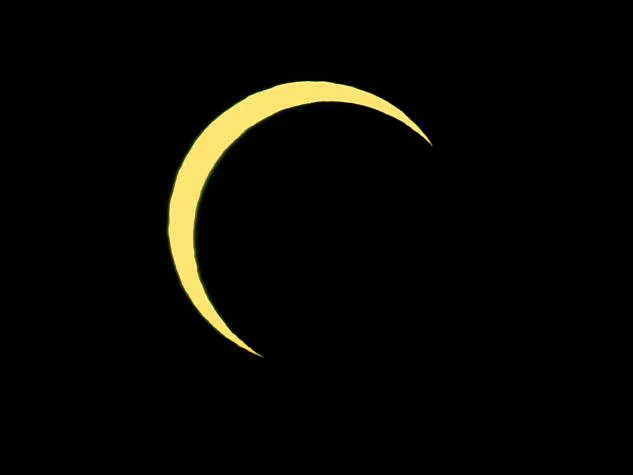Dubai: The UAE will witness a rare partial solar eclipse on June 21 with 86.31 per cent of the sun covered by the moon, Dubai Astronomy Club have announced in a circular on Saturday.
The phenomena will last two hours 57 minutes and 17 seconds from 8.14am until 11.12am with the maximum eclipse timed at around 9.36am.
Solar eclipses occur, when the Moon moves between Earth and the Sun and the three celestial bodies align.
The Moon’s shadow is not big enough to engulf the entire planet, so the shadow is always limited to a certain area. This area changes during the eclipse because the Moon and Earth are in constant motion. Solar eclipses are only visible from within the area where the shadow falls, and the closer you are to the centre of the shadow’s path, the bigger the eclipse looks, read a statement from Dubai Astronomy Club.
The annular phase of this solar eclipse - the ring of fire, where a ring of sun appears around the moon - is not visible in Dubai, but it can be observed here as a partial solar eclipse. The Moon covers a large portion of the Sun, so this is still a spectacular sight.
The annular phase of this solar eclipse is visible from parts of Africa including the Central African Republic, Congo, and Ethiopia; south of Pakistan and northern India; and China. Weather permitting, people in these areas will see the characteristic ring of fire.
Regions seeing, at least, a partial eclipse include; South/East Europe, much of Asia, North of Australia, much of Africa, the Pacific and the Indian Ocean.
Dubai Astronomy Group CEO Hassan Al Hariri said that this partial solar eclipse is massive in term of solar disk coverage by the moon and it is an amazing opportunity for UAE residents to observe this celestial phenomena with precautions. He insists that everyone must protect their eyes.
“Never look at the Sun, eclipsed or otherwise, without proper eye protection, like eclipse glasses,” he said. “The Sun’s rays can burn the retinas in the eyes leading to permanent damage or even blindness. A safe way to watch a solar eclipse is to wear protective eclipse glasses or to project an image of the eclipsed Sun using a pinhole projector.”
Al Hariri added that we witnessed many incidents after the last solar eclipse in December 2019, where people didn’t care about their protection and the result was devastation.
In India, Rajasthan, several school children damaged their retinas, fully and partially, by observing the solar eclipse without proper protection.
“Please be much more careful than the last event because this time, the eclipse will start at 08:14am, when most of the public will already be outside or maybe on way to office, unlike last time when it was earlier,” he added.
A Dubai Astronomy Group representative said that solar eclipse glasses are one of the most easy and safest options. ISO certified solar eclipse glasses are available at Al Thuraya Astronomy Centre for Dh20 each. Dubai Astronomy Group will also telecast the live view of the Solar Eclipse from Dubai and many other cities of the world.
Eclipse dos and don’ts
Network Links
GN StoreDownload our app
© Al Nisr Publishing LLC 2026. All rights reserved.
